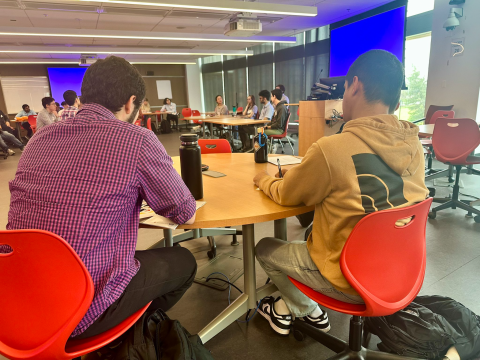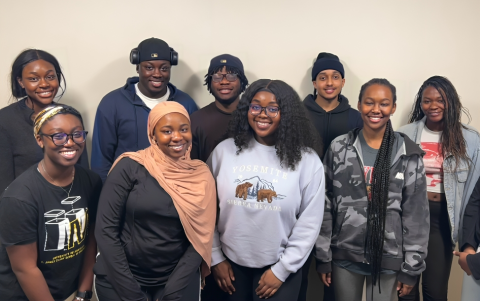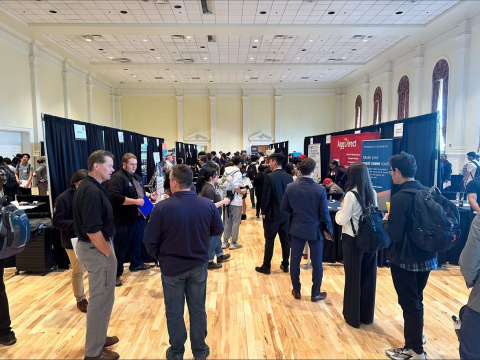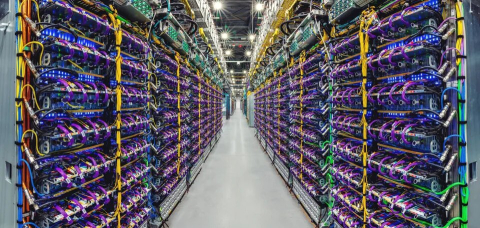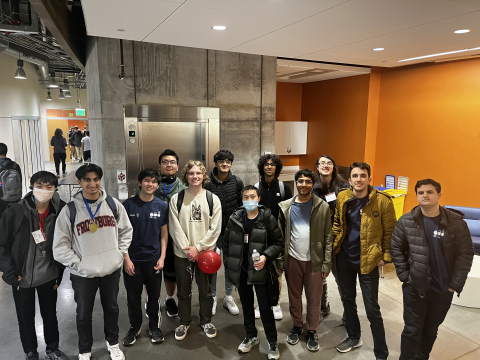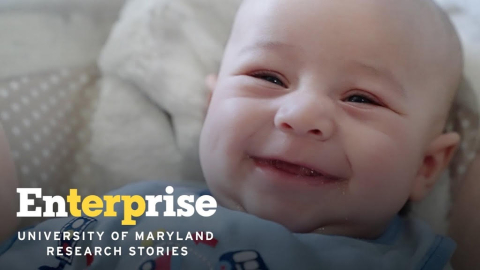Recent News & Accomplishments
2024
Prospective Ph.D. students explored opportunities and networked at the Brendan Iribe Center.
The University of Maryland's Department of Computer Science hosted its annual Graduate Visit Day on Friday, March 15, 2024, drawing approximately 60 prospective Ph.D. students to the esteemed Brendan Iribe Center for Computer Science and Engineering. The event provided a pivotal platform for aspiring graduate students to interact with faculty members, network with current students, and foster connections with their peers, providing a comprehensive overview of the academic and research opportunities . The day commenced with welcoming remarks from the Department Chair, Matthias Zwicker , and... read more
A student organization's quest to bridge the tech gap for people of color.
In an industry where innovation and diversity are crucial to progress, the representation of Black minorities in technology remains disproportionately low. Despite the growing recognition of the need for inclusivity, the tech sector continues to grapple with diversity and equitable opportunity challenges. This disparity underscores the importance of initiatives addressing these challenges and fostering an environment where underrepresented groups can thrive. Against this backdrop, at the University of Maryland's Department of Computer Science, a beacon of hope and action emerges in the form... read more
Computer science faculty members are among the 30 teams the Department of Defense selected to receive funding for innovative, multidisciplinary research projects.
The University of Maryland's Department of Computer Science is part of a cross-institutional team selected by the Department of Defense for the 2024 Multidisciplinary University Research Initiative (MURI) program. This initiative will support the team's project, "Algorithms, Learning and Game Theory: The Foundations of Multi-Agent Systems," focusing on theory and algorithms for learning and decision-making in multi-agent systems. Selected projects for the MURI program are expected to receive an average of $7.5 million over five years, encouraging collaborative research across various academic... read more
The award recognizes his noteworthy contributions to the field of scalable computing.
Abhinav Bhatele , an associate professor of computer science at the University of Maryland with a joint appointment in the University of Maryland Institute for Advanced Computer Studies (UMIACS) , has been awarded the IEEE Technical Committee on Scalable Computing (TCSC) Award for Excellence in Scalable Computing for Middle Career Researchers (MCR). The award is given to individuals who have demonstrated significant and influential contributions to the field of scalable computing, particularly those within 5 to 15 years of receiving their Ph.D. The committee recognizes up to three individuals... read more
James Purtilo discusses the role of AI in terms of national security.
Last month, the United States Department of Defense (DoD) announced that it had selected Scale AI to help test and evaluate generative artificial intelligence (AI) for military applications. Generative AI made headlines last year for its ability to create text, images and other data by utilizing algorithmic models in response to a user’s prompt. This has lead to concerns in what it means for content creators, as well as whether any photos and videos could be trusted as being “real” and not AI-generated. However, generative AI still offers the potential to streamline workflows and review... read more
UMD researchers have constructed a new mathematical shortcut for a wide range of calculations involving quantum systems.
Researchers in the Joint Center for Quantum Information and Computer Science (QuICS) and the Joint Quantum Institute (JQI) have constructed a new mathematical shortcut for a wide range of calculations involving quantum systems. Their results, published in the February 8 issue of the journal Physical Review X , answered an open question about whether such a shortcut even existed. The authors add that their work could lead to more efficient benchmarking for quantum devices, as well as more efficient ways of representing quantum states on classical hardware. The new shortcut, known as a... read more
Over 1,000 students and 36 companies converged at the Stamp Student Union Ballroom for networking and recruitment opportunities.
The University of Maryland's Department of Computer Science hosted its bi-annual Career and Internship Fair on February 26, 2024, at the Stamp Student Union Ballroom. The event, designed to connect students with potential employers, featured 117 representatives from 36 companies, including eight corporate partners. It drew diverse organizations, including startups, government agencies, mid-size tech firms and large industry players, spanning sectors like finance, environmental services and security. Over 1,000 undergraduate and graduate students attended this year’s fair, each carrying... read more
Jennifer Golbeck discusses the sudden rise of AI services and its eventual impact on society.
It seems like every day another company announces a new generative AI product or service. From apps that summarize your meetings to platforms that help with photo editing and customer support bots, generative AI is all any tech firm wants to talk about. Still, not every piece of generative AI software is going to be a breakthrough like OpenAI’s ChatGPT, the bot that helped kick off this new tech revolution. But don’t expect that to slow the seemingly endless parade of platforms and tools coming to market. Even if some of those products appear doomed from the outset. “I think we are in kind of... read more
Graduate student Shayan Chashm Jahan and undergraduate students Colin Galen and Cheng-Yuan Lee advance to the North American Championship.
A student team from the University of Maryland’s Department of Computer Science won the International Collegiate Programming Contest (ICPC) North American South Division championship on February 24, 2024, at John Hopkins University. The victory placed the group at the forefront of the competition, which saw participation from 138 teams across the Mid-Atlantic, South Central and Southeast regions, representing 55 universities. Representing UMD in the competition were graduate student Shayan Chashm Jahan and undergraduate students Colin Galen and Cheng-Yuan Lee. Guided by their coach, Professor... read more
New chatbot puts trusted health intel at new mothers’ fingertips.
Baby’s first bath, a 3 a.m. fever and technicolor spit-up can elicit a range of emotions from first-time mothers—and just as many questions. An AI-based chatbot in development by University of Maryland researchers is working to take some of the confusion and uncertainty out of parenting, particularly for women of color. Called “Rosie," the phone-based bot was developed with support from a $3 million grant from the National Institute on Minority Health and Health Disparities. The system provides accurate, 24-hour health and wellness information for questions like medication dosages,... read more
